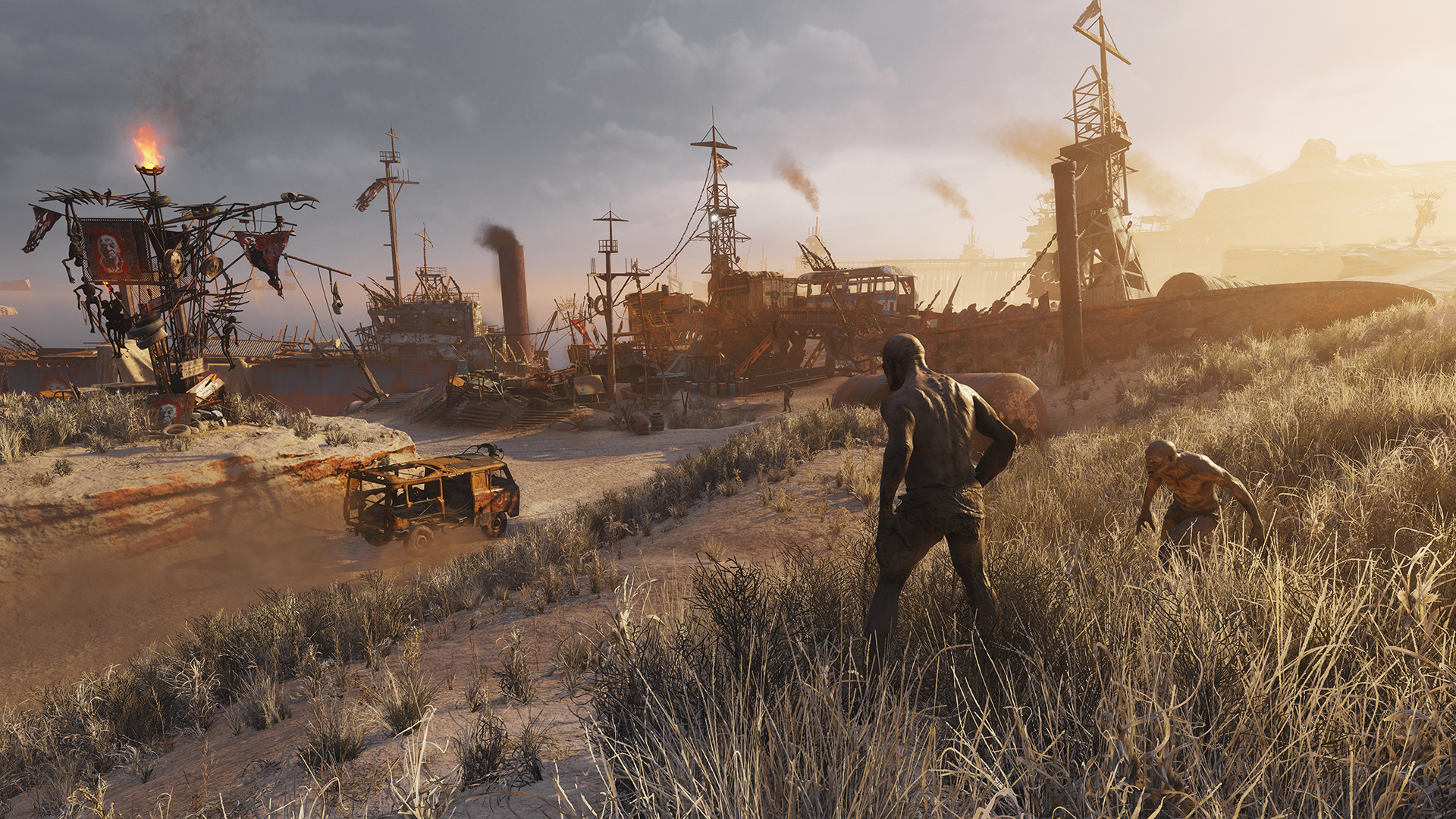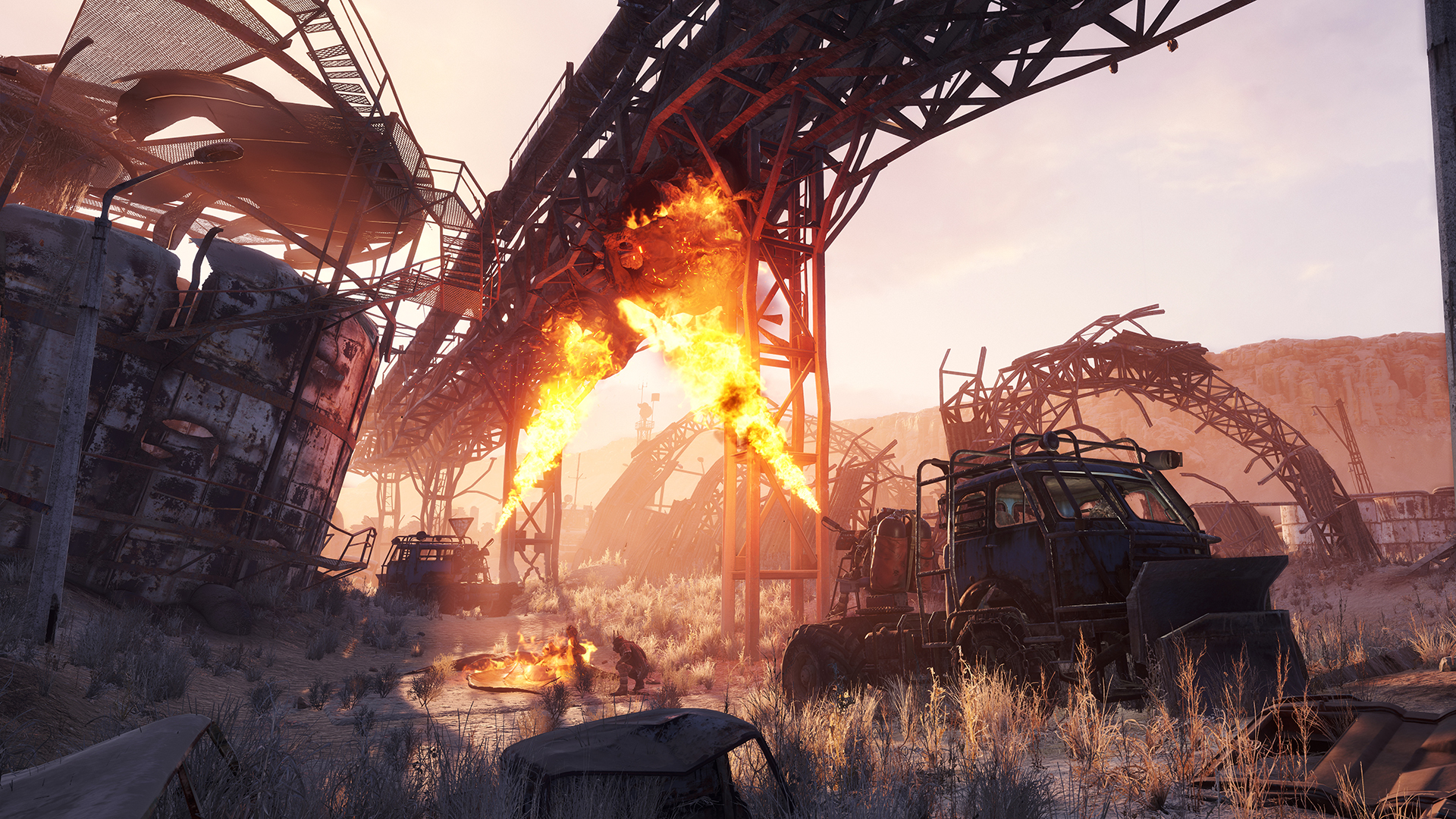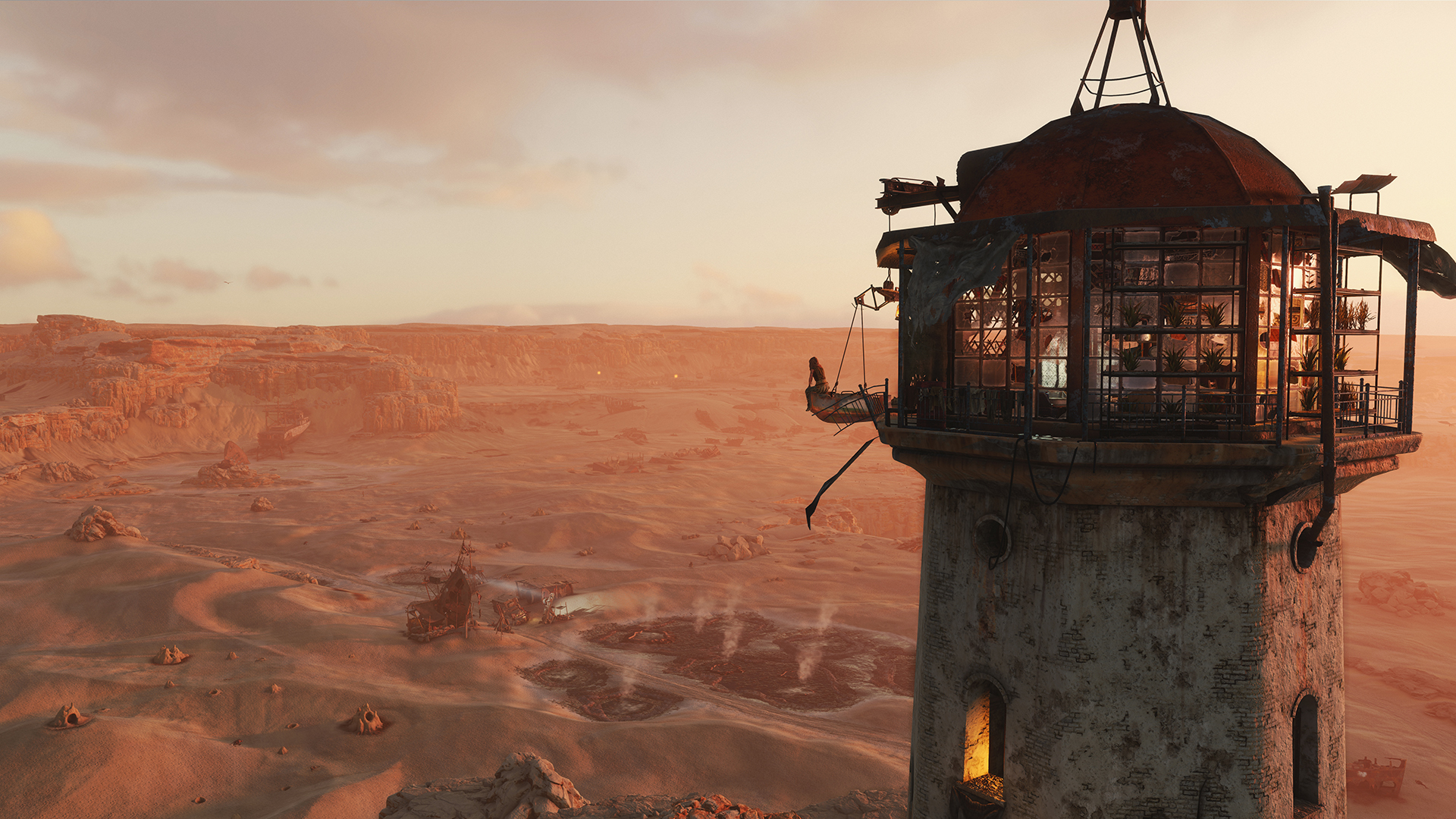Metro Exodus takes time to truly make sense as an open world game
But it's worth the wait.
Above: hear me awkwardly ramble about Metro Exodus about 10 minutes before I had my first coffee of the day.
Metro is a series I associate with dingy, cold underground tunnels, so stepping into an environment that's almost entirely sand and sun is a bit of a shock. This is the Caspian Sea section of 4A's survival FPS, set during a scorching summer, and what was once a body of water has dried out, leaving miles of hot desert and rusty remnants of a port in its wake. Variously sized silhouettes of flying demons are a common sighting across the map. Artyom's train, the Aurora—on which you're taking a year-long trip to find a better life with the other survivors—needs fuel, and the people are desperate for water. As the all-purpose errand guy, you have to arrange both.
I spent over three hours pottering around this hub, completing a variety of missions that encompass classic Metro-style underground-set horror and more open-ended shooter set pieces. I also took the time to mark optional areas of interest with Artyom's binoculars, checking locations out and seeing what loot I could find. At the start of the section, you climb off a train and clear out a location swarming with 'humanimals'—basically irradiated zombie men who run at you—and get the key to a shabby but operable van, which you can use to travel across the map. You can run even enemies down along the way if you want.

The previous Metro games had their slow moments for sure, but the pace in Exodus can be pretty languid. There are plenty of large-scale set pieces to break the game up, but also extended stretches of poking through rusted ships for corpses or containers that might be carrying loot. I think this structure will be divisive, but I came around to taking my time to enjoy the world by the end of the demo. I'm almost certain that other players will find it too slow, but I like that Metro is brave enough to test your patience, even if that results in some periods where nothing much happens at all.
This particular map is beautiful, too. Knowing that Metro Exodus lets you explore this hot and dry environment alongside the icy and autumnal forest sections we've already seen makes it feel like a much larger prospect than previous entries. While ammo shortages are perhaps more annoying in a world that's not as neatly structured as levels from previous Metro games, the day and night cycles make them feel like proper places. They're also not so large that you'll get lost in them—it's a good balance of size and detail.
I will say this: the rewards for clearing out a side area of enemies could be easier to parse as a player. Yes, you'll find items you can use to craft items by, say, killing a group of humans positioned in sniper spots on an old crane, and maybe you'll pick up an audio tape explaining what happened in that location beforehand. With no experience-based system, though, there is a sense that you're doing these asides for the hell of it. Finishing an optional aside, I sometimes wondered if I was better off driving away and saving my ammo than trying to kill everyone.
Players who want to diligently pick through the world and enjoy the experience of doing so won't think too hard on it—but I wouldn't mind the game bookending these sections with more notable rewards beyond a little tick on Artyom's map suggesting the area is finished.
Keep up to date with the most important stories and the best deals, as picked by the PC Gamer team.

Based on what I played, mutants in the game don't seem to drop useable crafting items, which is a little strange given how many of them there are wandering around. I had to take all my loot from humans instead. Throughout Metro Exodus, you'll craft health items, makeshift bullets and more, so finding their components is a priority. This suggests there's no real incentive to fighting anything non-human in the world, and that you're always better off avoiding encounters, since they're just going to soak up ammo and health items for no benefit. I guess this is realistic, but fighting one of the larger flying creatures is genuinely exciting—some reward for bringing one down from a distance would be fine with me.
There are some other rougher edges to Exodus. Enemy creature animations tend to look a bit janky, even if the 3D models are impressively grim to behold. Not all the game's set pieces are winners, either. During one large-scale shootout later in the demo where Artyom and the crew of the Aurora are surrounded by local human hostiles, Metro doesn't quite feel cut out for it—crouching behind a wall to craft a healing item and ammo from your backpack while five enemies open fire on you is a little odd. Metro ain't Call of Duty, which suits me just fine, but for a moment it feels like you're playing a set piece from another game. And it's a bit of a slog.

Another section of the demo, set in an underground area of the Caspian Sea map, is more traditionally Metro-y. You have to navigate a mostly pitch black environment using a lighter, which keeps hordes of mutated spiders at bay. At one point I got a bit too close to the screen as one crawled across Artyom's face, which made me jump in a way that anyone would describe as embarrassing. This part of the game, while a little too repetitive, suggests that no matter where you end up in Metro, you'll still find plenty of reasons to go underground.
It's worth saying that playing a game like this in chunks means I don't have a sense of the larger story or themes, and I'm looking forward to finding out how this journey across Russia links together. In the Caspian Sea portion of the game, there is a sub-story of slavers and water being a precious resource. That suggests each 'season' will offer self-contained stories starring local characters, which is a neat idea.
Exodus is definitely taking a risk by going open world, but I'm pretty confident that I'll enjoy exploring these places and meeting these people. After an hour, I felt like Exodus was moving too slowly. After three hours, I wanted to see everything on the map before the Aurora moved on to its next destination, even knowing there'll be a lot of downtime in doing so.


